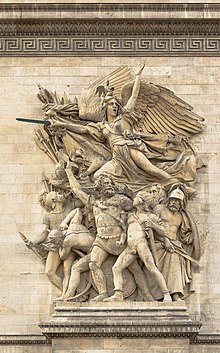| English: 'The Marseillaise' | |
|---|---|
 The Marseillais volunteers departing, sculpted on the Arc de Triomphe | |
National anthem of France | |
| Also known as | « Chant de Guerre pour l'Armée du Rhin » (English: 'War Song for the Army of the Rhine') |
| Lyrics | Claude Joseph Rouget de Lisle, 1792 |
| Music | Claude Joseph Rouget de Lisle |
| Adopted | 14 July 1795 |
| Readopted | 1870 |
| Relinquished | 1799 |
| Audio sample | |
Instrumental rendition in A-flat minor | |
"La Marseillaise"[a] is the national anthem of France. The song was written in 1792 by Claude Joseph Rouget de Lisle in Strasbourg after the declaration of war by France against Austria, and was originally titled "Chant de guerre pour l'Armée du Rhin"[b] ("War Song for the Army of the Rhine").
The French National Convention adopted it as the First Republic's anthem in 1795. The song acquired its nickname after being sung in Paris by Fédéré (volunteers) from Marseille marching to the capital. The song is the first example of the "European march"[clarification needed] anthemic style. The anthem's evocative melody and lyrics have led to its widespread use as a song of revolution and its incorporation into many pieces of classical and popular music.
The Italian violinist Guido Rimonda pointed out in 2013[1] that the incipit of "Tema e variazioni in Do maggiore" of Giovanni Battista Viotti[2] has a strong resemblance to the anthem.[3][4] This incipit was first thought to have been published before La Marseillaise, but it appeared to be a misconception as Viotti published several variations of "La Marseillaise" in 1795[5] and wrote as a note "I have never composed the quartets below" (Je n'ai jamais composé les quatuors ci dessous).[6][7][8]
Cite error: There are <ref group=lower-alpha> tags or {{efn}} templates on this page, but the references will not show without a {{reflist|group=lower-alpha}} template or {{notelist}} template (see the help page).
- ^ "Archived copy". Archived from the original on 12 May 2024. Retrieved 12 May 2024.
{{cite web}}: CS1 maint: archived copy as title (link) - ^ "Archived copy". YouTube. Archived from the original on 11 May 2024. Retrieved 12 May 2024.
{{cite web}}: CS1 maint: archived copy as title (link) - ^ La Marseillaise, un hymne à l'histoire tourmentée Archived 25 April 2021 at the Wayback Machine.
- ^ Micaela Ovale & Guilia Mazzetto. "Progetti Viotti" (PDF). Guido Rimonda (in Italian). Archived (PDF) from the original on 10 March 2021. Retrieved 24 August 2019.
Basti ricordare che "La Marsigliese" nasce da un tema con variazioni di Viotti scritto nel 1781, ben 11 anni prima della comparsa dell'inno nazionale francese ufficiale (ri-orchestrato da Berlioz con l'aggiunta delle parole da R. De Lisle). Il brano sarà presente nel secondo CD dell'integrale in uscita nel marzo 2013.
. - ^ Viotti, Giovanni Battista. "Six quatuor d'airs connus dialogués et variés pour deux violons, alto et violoncelle, divisés en deux Parties. 1° parte – Giovanni Battista Viotti". MLOL (in Italian). Retrieved 23 May 2024.
- ^ Dellaborra, Mariateresa (31 December 2017). Giovanni Battista Viotti: «professione musicista»: Sguardo sull'opera, lo stile, le fonti (in Italian). Società Editrice di Musicologia. ISBN 978-88-85780-04-0. Archived from the original on 23 May 2024. Retrieved 23 May 2024.
- ^ "Miscellanea: "Viotti e la Marsigliese. Falso e vero o i bufalari smascherati" di Giuseppina La Face e Carlo Vitali" (in Italian). Accademia della Bufala. Archived from the original on 28 February 2024. Retrieved 23 May 2024.
- ^ Fauré, Georges (15 October 2020). "Curiosità: l'hymne français a-t-il été composé par un Italien ?". Alliance Franco-Italienne de Midi-Pyrénées (in French). Archived from the original on 23 May 2024. Retrieved 23 May 2024.